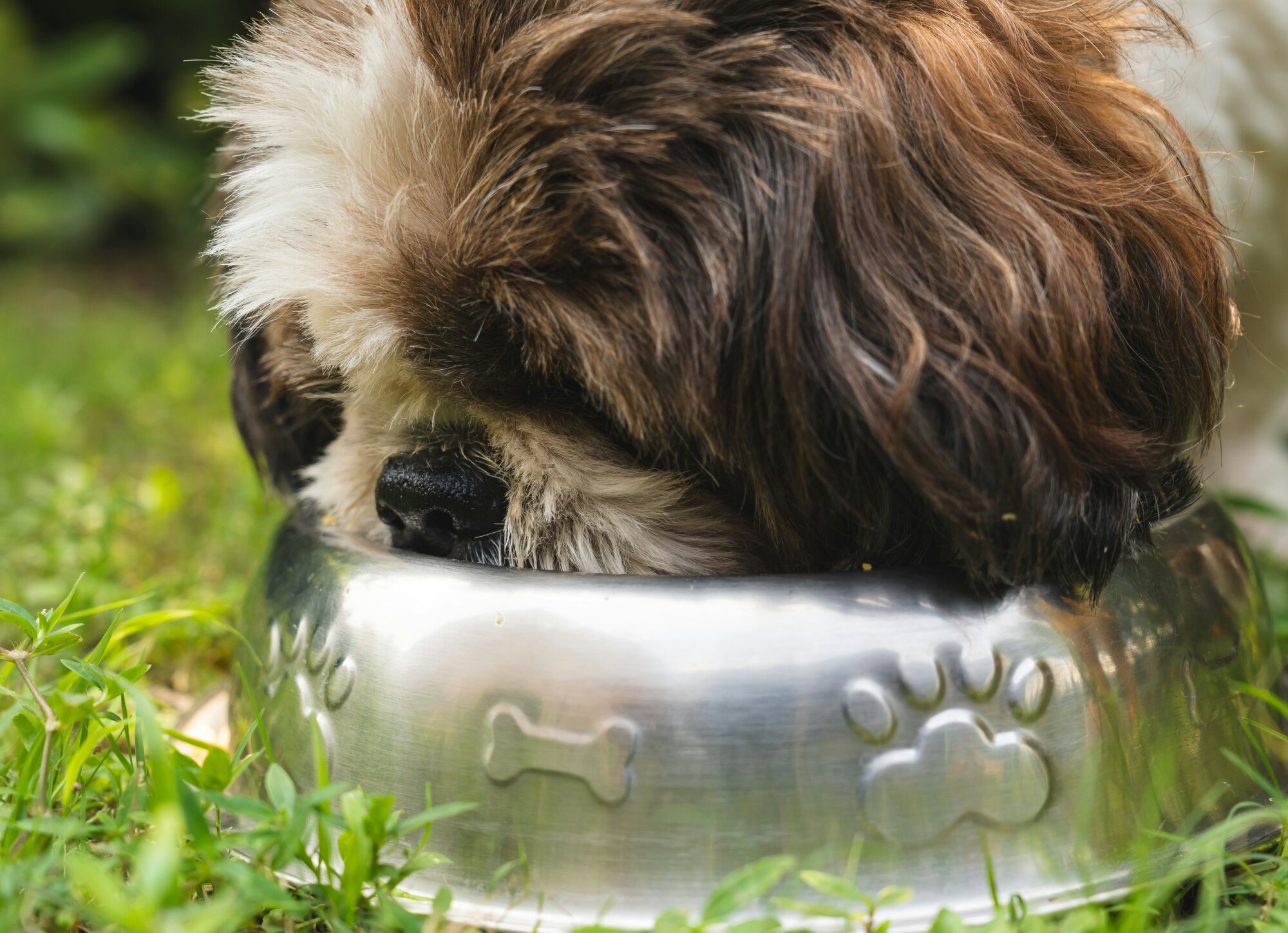So, you've noticed your pup struggling with symptoms like itching, scratching, and licking after meals. You've considered seasonal allergies, but environmental allergens don't seem to be the trigger.
Despite your dog never having issues with their food before, they may have developed a food allergy or a food intolerance.
As a pet parent, it's helpful to know the symptoms of food allergies in dogs and how to manage food allergies to find relief.
In this article, we'll cover:
- What are dog food allergies
- Why do dogs get food allergies
- 10 symptoms of food allergies
- How to test for a food allergy
- How to treat dogs' food allergies

What are dog food allergies
Food allergies are caused when a dog's immune system has a negative reaction to a specific ingredient and treats it as a foreign substance. These reactions are a result of their immune system trying to get rid of the "foreign substance."
This leads to inflammation and changes in your dog's body like:
- Redness
- Swelling
- Itching
- Watery eyes
- Diarrhea
- Vomiting
Dogs can have allergies as puppies, or they can develop them later on. Even if your dog has been eating the same diet for years, they can develop a food allergy to certain retail pet foods or a specific food ingredient.
The most common food allergies in dogs are allergies to proteins, including:
- Dairy products
- Beef
- Chicken
- Eggs
- Soy
- Wheat gluten
Food allergies vs. food sensitivities
True food allergies are less common than food sensitivities in dogs. Food allergies trigger an allergic reaction. Food sensitivities trigger less serious signs like digestive issues, sneezing, and itching.
Why do dogs get food allergies
Food allergies are triggered by an immune response. There is no clear reason why so many dogs develop allergies, but some dog breeds are more prone to food allergies than others.
Dog breeds especially prone to food allergies include:
- Labrador Retrievers
- Golden Retrievers
- English Springer Spaniels
- Cocker Spaniels
- Collies
- Miniature Schnauzers
- Shar-Peis
10 symptoms of dog food allergies
Clinical signs of food allergies can be similar to reactions caused by other allergies. Here are 10 food allergy symptoms in dogs to look out for.
1. Vomiting and diarrhea

Vomiting and diarrhea are common signs of food sensitivities in dogs. When your dog consumes food they are allergic to, they may get an upset stomach.
This can lead to vomiting and diarrhea. Be sure to check for other symptoms, as vomiting and diarrhea are common reactions to many health conditions.
2. Itchy skin

Similar to allergic reactions from flea saliva (flea allergy dermatitis), food allergies in dogs can cause itchiness and other skin problems. Itchy feet and ear flaps are common in dogs struggling with food allergies.
3. Licking paws

Constantly licking paws is also a sign of seasonal allergies and skin infections. When your dog's paws are itchy, your dog may excessively lick to soothe them. Using pet wipes can help clean and soothe irritated skin on your dog’s ears, skin, and paws.
4. Secondary infections

Excessive itching, scratching, and licking may lead to secondary skin infections. That's why it's important to address itchy and dry skin quickly to relieve your dog's symptoms and avoid infections.
5. Lack of energy

Food allergies in pets can cause symptoms like lethargy and low energy. If your dog has lost interest in playtime or long walks, they may struggle with food allergies.
6. Weight loss

If your dog constantly has diarrhea or vomits from food, they may quickly lose weight. Sudden weight loss is unhealthy for dogs and should be addressed right away.
7. Hair loss

Constant itching and scratching can lead to hair loss in dogs. Licking, scratching, and chewing broken skin can create bald spots in your dog's fur.
8. Aggression

Food allergies can impact a dog's nervous system and cause inflammation, leading to discomfort and changes in behavior. Dogs may also become anxious or aggressive if they are having trouble digesting their food or are in pain.
9. Weakened immune system

When your pup's immune system overreacts to an allergen, it is harmful to the body. While allergic reactions are a natural immune response, chronic inflammation can lead to disease and poor immune system health if left untreated.
10. Allergic reaction

Serious allergies to certain foods may cause anaphylactic shock. Anaphylactic shock causes a rapid decrease in blood pressure and can be life-threatening for dogs. If your dog is struggling to breathe and swelling after eating, take them to an emergency vet hospital immediately.
VET TIP
If your dog is struggling with these common signs or other symptoms of allergic responses, talk to your vet. These symptoms may be caused by other pet health issues.
How to test for a food allergy
Diagnosing food allergies is tricky. The best option is to visit a veterinary nutritionist for a food trial or allergy testing.
You know your pet best. No matter which method you try, diagnosing food allergies is important to find relief.
Food trials
Food trials, also known as diet trials, are the most common way to diagnose food allergies in dogs. A food trial lasts eight to twelve weeks and should be followed exactly as prescribed by a veterinarian.
There are many ways to follow a prescription food trial. The most common food trial is an elimination diet or a hydrolyzed protein diet.
- An elimination diet trial has a single source of protein and carbohydrates. Elimination diets are prescription diets created by a vet, or outlined by a vet for pet parents to prepare at home.
- A prescription hydrolyzed protein diet has proteins broken down into small particles. This prevents your dog's immune system from responding to the proteins and causing a reaction.
Allergy testing
You can also try to diagnose food allergies through allergy tests. There are blood tests and skin tests for diagnosing allergies in dogs.
- During a blood test, a small blood sample is taken and sent to a lab where it is examined for allergen-specific antibodies.
- During a skin test, a veterinarian injects small amounts of allergens into your dog's skin. Skin testing to diagnose your dog's allergies is less reliable than blood testing.
How to treat dogs' food allergies

There is no cure for food allergies in dogs. But, there are some things pet parents can do when treating food allergies in dogs.
Follow a special diet.
If a dog parent tries a novel protein diet or a different diet trial and learns their dog is allergic to chicken, the best way to treat that allergy is to avoid feeding their dog chicken. Curate a hypoallergenic diet for your dog to keep their allergies at bay.
Hypoallergenic diets may seem simple, but avoiding proteins like chicken in food and treats can be tricky. Be sure to read labels before feeding your dog food or treats, and talk to your vet about how to feed your dog an appropriate diet.
Try supplements.
If you have to cut essential proteins out of your dog's diet due to a food allergy, you may wonder what you can do to fill the gaps. Supplements are a simple way to ensure your dog is getting all the vitamins and minerals they need to stay healthy.
Supplements with ingredients like omega-3 fatty acids can also help reduce inflammation and promote a healthy immune system. Talk to your vet about what supplements are right for your dog.
Consider allergy medications.
There are some over-the-counter medications for common allergies in dogs that may provide some temporary relief. But, allergy meds should only be used as a remedy for allergic reactions. Allergy medications are not a long-term solution for your dog's allergies.
While there is no cure for food allergies in dogs, it's helpful to know the common symptoms. And, what you can do to provide relief and keep your dog happy and comfortable.


